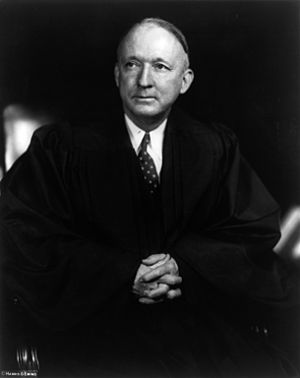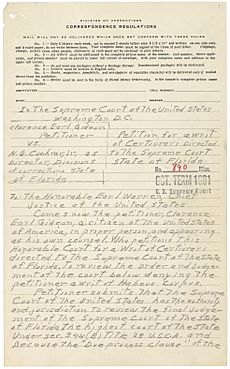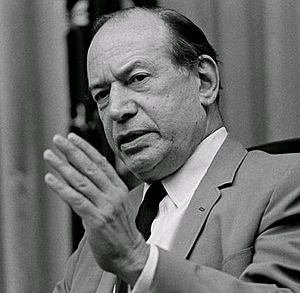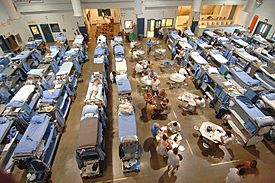Gideon v. Wainwright facts for kids
Quick facts for kids Gideon v. Wainwright |
|
|---|---|

|
|
| Argued January 15, 1963 Decided March 18, 1963 |
|
| Full case name | Clarence E. Gideon v. Louie L. Wainwright, Corrections Director. |
| Citations | 372 U.S. 335 (more) |
| Prior history | Gideon convicted, Bay County, Florida Circuit Court (1961); habeas request denied, Gideon v. Cochrane, 135 So. 2d 746 (Fla. 1961) |
| Subsequent history | At 2nd trial, Gideon found not guilty, 153 So. 2d 299 (Fla. 1963) |
| Argument | Oral argument |
| Holding | |
| States must assign free lawyers to poor defendants. The states must follow the Sixth Amendment's right to counsel rule because the Fourteenth Amendment requires due process. | |
| Court membership | |
| Case opinions | |
| Majority | Black, joined by Warren, Brennan, Stewart, White, Goldberg |
| Concurrence | Clark |
| Concurrence | Harlan |
| Concurrence | Douglas |
| Laws applied | |
| Sixth and Fourteenth Amendments | |
|
This case overturned a previous ruling or rulings
|
|
| Betts v. Brady (1942) | |
Gideon v. Wainwright was a very important case decided by the U.S. Supreme Court in 1963. The Court ruled that if someone is accused of a crime and cannot afford a lawyer, the state must provide one for free. This decision led to the creation of the public defender system in the United States. A public defender is a lawyer who helps people who cannot pay for legal help.
Contents
The Story of Clarence Gideon
What Happened to Gideon?
In June 1961, someone broke into the Bay Harbor Pool Room in Panama City, Florida. The person broke a door, smashed a cigarette machine and a record player, and stole coins.
Later that day, a witness said he had seen Clarence Earl Gideon at the pool room early that morning. The witness said Gideon left with a wine bottle and money. Based on this, the police arrested Gideon. They charged him with breaking into a building with the plan to steal. In Florida at that time, this crime could mean up to five years in prison.
Why Gideon Needed a Lawyer
When Gideon went to court, he told the judge he could not afford a lawyer. He asked the judge to give him one for free. The judge said no. At that time, Florida law only required free lawyers for people accused of very serious crimes, like murder. Gideon's crime was not considered that serious.
So, Gideon had to defend himself in court. He was found guilty and sent to prison.
Laws About Lawyers in Court
Before Gideon's Case
Before 1963, a Supreme Court case called Betts v. Brady (1942) was the rule. It said that states only had to provide a free lawyer if someone was accused of a "capital crime" (a crime that could lead to the death penalty). For other crimes, states did not have to provide lawyers, even if the person was poor.
The Court in Betts v. Brady said that having a lawyer was not always needed for a fair trial. However, they did say that in "special cases," like if a defendant had little education, a lawyer might be needed.
The Problem for Poor People
This meant that in Florida, most poor people accused of crimes did not have lawyers. They had two choices: plead guilty or try to defend themselves. One Florida lawyer remembered that before 1963, "lawyers were likely to appear in Florida courtrooms only for the wealthy."
Gideon wrote from prison about what he saw:
One day when I was [in court], I seen two trials of two different men tried without attorneys. In one hour from the time they started they had two juries out and 15 minutes later they were found guilty and sentenced. Is this a fair trial? This is a common practice thru most of the state.
Gideon's Appeal from Prison
First, Gideon asked the Florida Supreme Court to set him free. He said he was unfairly imprisoned. But the Florida Supreme Court quickly said no.
From his prison cell, Gideon used the prison library. He wrote a letter in pencil to the U.S. Supreme Court. He asked them to review his case. He wrote that his rights under the Fourteenth Amendment and Sixth Amendment had been "violated."
Gideon argued that he should have had a lawyer. He said that without a lawyer, he did not get "due process of law." Due process means that the government must follow fair rules and respect all legal rights when it takes away someone's freedom. The Fourteenth Amendment says no state can take away a person's "life, liberty, or property, without due process of law."
The Supreme Court agreed to hear Gideon's appeal. They decided to "reconsider" (re-think) their earlier decision in Betts v. Brady.
The Supreme Court Case
The Main Question
The Supreme Court had to answer one big question. The Sixth Amendment says people accused of crimes have a right to a lawyer. The Court had already said this applied in federal courts (courts run by the U.S. government). Now, they needed to decide if this right also applied in state courts (courts run by each state). Did every person accused of a crime in a state court have the right to a lawyer, even if they could not pay?
Arguments for Gideon
The Supreme Court assigned a famous lawyer named Abe Fortas to represent Gideon. Fortas later became a Supreme Court Justice himself.
Fortas argued that it is impossible for a person to get a fair trial without a lawyer. He said that the Fourteenth Amendment's "due process" rule means states must give people a fair trial before taking away their freedom. By not giving Gideon a lawyer, Florida denied him a fair trial. This violated his right to due process.
Arguments Against Gideon
A lawyer named Bruce Jacob argued against Gideon. He made several points.
Jacob argued that the Constitution lets states make their own rules for criminal trials. He talked about federalism. This is the idea that power is shared between the federal government and state governments. Jacob said that if the federal government made a rule forcing states to provide free lawyers, it would be overstepping its power. This would take away a right the Constitution gave to the states.
Jacob also argued that a person does not always need a lawyer for a fair trial. He said that judges and even prosecutors help protect the rights of people who defend themselves.
Finally, Jacob warned that if the Court ruled for Gideon, there would be big problems. He said states would need many more lawyers and a lot more money. In Florida, 65% of the 8,000 prisoners (about 5,200 people) had not had lawyers. Jacob argued that many of these prisoners might go free if the Court ruled for Gideon.
The Court's Decision

On March 18, 1963, the Supreme Court voted 9-0 that Gideon was right. His rights had been violated.
The Court ruled that the Sixth Amendment's right to a lawyer does apply to the states. They said that without a lawyer, a person cannot get a fair trial. If a person does not get a fair trial, they are not getting "due process of law." This is a right guaranteed by the Fourteenth Amendment. So, because people have the right to due process, they have the right to a fair trial. And because they cannot get a fair trial without a lawyer, they also have the right to a lawyer.
The Court also said that its earlier decision in Betts v. Brady had been wrong. This ruling overturned the Betts decision, meaning it was no longer valid. Justice Black, who had disagreed with the Betts decision in 1942, wrote the main opinion for the Court. He said:
[In] our ... system of criminal justice, any person ... who is too poor to hire a lawyer, cannot be assured a fair trial unless counsel is provided for him.
... From the very beginning, our state and national constitutions have laid great [importance] on [protections] designed to assure fair trials before impartial [courts] in which every defendant stands equal before the law. This noble ideal cannot be realized if the poor man charged with crime has to face his accusers without a lawyer to assist him.
After the Supreme Court's Ruling
Gideon's New Trial
The Supreme Court's ruling did not mean Gideon was automatically free. It meant he would get a new trial. This time, he would have a free lawyer.
Gideon asked for a lawyer named Fred Turner, who was very well-known. The judge agreed. With Turner arguing the case, the jury found Gideon not guilty in less than an hour. Gideon was set free that day.
"I believe that each era finds an improvement in law for the benefit of mankind."
– Quote on Gideon's gravestone
Gideon died on January 18, 1972. He was buried in an unmarked grave in Missouri.
Years later, the American Civil Liberties Union paid for a headstone for Gideon's grave. On it is a quote based on something Gideon wrote: "I believe that each era finds an improvement in law for the benefit of mankind."
Impact on Other Prisoners
Because of the Supreme Court's decision, all 5,200 prisoners in Florida who had been convicted without a lawyer had the right to a new trial. About 1,200 of these prisoners were set free without a new trial. This happened because witnesses had died or moved away, and the state did not have enough evidence to try them again.
The same year Gideon was decided, Florida set up its public defender system. Throughout the 1960s, other states that did not have public defender systems also created them.
Why Gideon is Important Today
When Gideon was decided, 13 states still did not always give lawyers to poor people accused of crimes. Like in Florida, many of these people did not get fair trials without a lawyer's help. After the Gideon decision, every person charged with a crime in any U.S. court has the right to a lawyer. This is true even if they cannot pay for one. People can choose not to have a lawyer, but that is their choice.
Four years after Gideon, the Supreme Court ruled that the Gideon decision applied "retroactively." This means it applied even to people who were convicted before 1963. The Court decided that people could not get a fair trial without lawyers. This was true for everyone, even those convicted before 1963. These people also deserved new trials with free lawyers.
Challenges for Public Defenders Today
The Gideon decision still guarantees free lawyers to poor people accused of crimes. However, many legal experts say there are problems with the public defender system today. They argue that because of these problems, many poor people are not getting the rights that Gideon gave them.
One big problem is that public defender programs often do not get enough money from the government. This means:
- Programs cannot hire enough lawyers.
- Public defenders have to handle many cases at once.
- When lawyers have too many cases, they have little time for each one. They cannot do their best work.
- These lawyers are not paid well, and their jobs are very stressful. Many do not stay in public defender jobs for long.
- Some public defenders have little experience in criminal law.
- Many poor people get a free lawyer for their trial, but later are told they must pay for the lawyer's services.
When public defenders cannot do their jobs well, people accused of crimes may get harsher punishments if they are found guilty.
|
 | Frances Mary Albrier |
 | Whitney Young |
 | Muhammad Ali |




